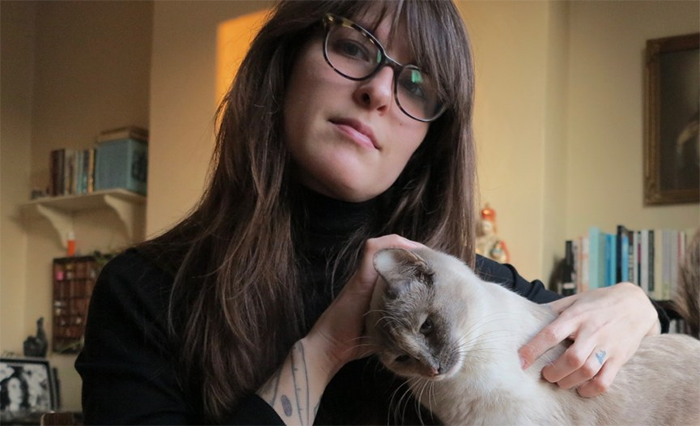Chelsea Gunn, Assistant Professor
Before Instagram, Facebook, and even Myspace, ’90s kids had GeoCities — a free website-building platform that hosted millions of personal pages. Yahoo bought GeoCities near the end of the decade, shortly before a rise in other platforms, and eventually decided to shutter the site in 2009. But what happened to everyone’s personal archives? Not everybody could remember their dated passwords and retrieve their content before Yahoo removed it forever. Digital archivists, other members of Gunn’s field, have combed through these remnants of the early internet to give an accurate and relatable depiction of the environment to benefit a collective digital humanity, something to which Gunn has dedicated her academic pursuits.
Chelsea Gunn utilizes the intersection of academic disciplines
Chelsea Gunn wants you to rethink your perception of archival research.
“I think there’s still this sort of perspective out there of archives as these sort of locked-up spaces that maybe you’re not supposed to go into,” Gunn says. “I think that’s one of the really important things we have to do in our field, make archives more participatory and make them more inclusive.”
Not only should everyone have access to archival research and digital humanities project preservation, but Gunn thinks it’s something everyone should pay attention to, even if they don’t have a background in information science. This motivates her work analyzing digital archives, especially social media presences such as GeoCities. She seeks to understand and share with others the role these records play in daily life and how analyzing past records can provide fascinating insights on a certain moment.
“It gives you a different perspective about what events were really like for everyday people,” Gunn says, “like what the impact of these big moments in history was.”
Gunn has channeled her archival interests in several different research initiatives, both during her time as an SCI PhD candidate and now as faculty in the Department of Information Culture and Data Stewardship. These efforts include the Institute for Advanced Topics in Digital Humanities, a lecture series funded by the National Endowment for the Humanities during the 2018-19 school year. She worked alongside SCI faculty Alison Langmead, among other co-researchers, to travel the country and work with other digital humanities project investigators and help them preserve their digital scholarship.
The workshop wrapped up in 2019, but those who couldn’t attend will soon have the opportunity to employ Gunn and her fellow co-researchers’ strategies in their own communities. With the Socio-Technical Sustainability Roadmap, all kinds of digital humanities project leaders can sustain their work, such as digitized art collections or literary catalogs, long after they stop working on it. Gunn says the workshop teaches preservation methods, such as open file formats, which allow users to open files on a wide variety of programs. The team expects to have the guide ready for community use by the end of the year.
While designing this workshop in all its stages, Gunn says she had always envisioned an equitable process. This began with choosing workshop locations in less frequented areas that might not always have reliable access to these methodologies and offering travel bursaries for participants. Gunn says they envision the road map further sustaining widespread access to project preservation in a variety of fields.
“To me, it’s one of the real strengths of this project, that anyone can do this workshop and it’s not just ours and limited to our facilitation,” Gunn says. “I’m always happy when I hear someone’s using this and getting something out of it or putting their own spin on it.”

